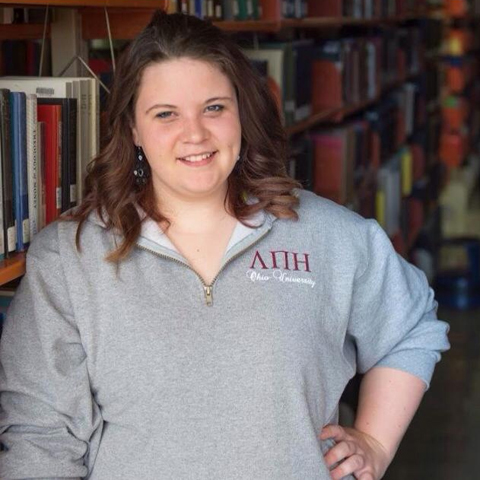For many undergraduate students, the idea of pursuing an independent research project can be daunting. Substantial research is often something reserved for graduate school, but Ohio University has opportunities for undergraduates to conduct research and have that research funded.
Funding for substantial undergraduate research comes from the Office of the Vice President for Research through the Student Enhancement Award (SEA). Katie Dawes, a senior studying Communication Studies and pursuing a Certificate in Law, Justice & Culture was awarded the SEA this year.
Her project is a feminist pedagogical mobile application meant to serve introductory level Women, Gender and Sexuality Studies (WGSS) classrooms in two ways. First, the application is a social media outlet that functions much like Facebook. Students can post to a feed, “like,” and comment on other posts and develop a profile. Second, the app functions as a wiki, centralizing and categorizing basic feminist knowledge in one location.
Dawes developed the app with her research partner Jennifer Seifert, a doctoral student in Communication Studies. The pair designed the app, and Ricky Chilcott, Technology and Facilities Manager for Scripps School of Communications, and Timothy Grannan, a Computer Science graduate developed it. Dr. Patty Stokes is currently testing the app in her Feminist Theory class.
“Hopefully it helps students to better understand feminist ideology and connect major points across the entire feminist knowledge,” says Dawes. Instead of a simple Google search, she hopes that this app will give students an alternative means to find information they seek. “The Internet is a wonderful tool, but it is often a tool that students have difficulty harnessing its full potential,” she says.
In addition to helping students easily access information, Dawes hopes that this app gives students a more familiar medium to work with that alternative sources. “I find that information is more easily accessed, and it is more familiar to students who are already engaging in social medias.
“The Wiki function provides information that is quick and structured, but is also accessible. The social media function can act much like an improved version of Blackboard’s discussion board,” she says.
By specifically focusing on WGSS classrooms, Dawes hopes their project will inform pedagogical practices in WGSS courses specifically and university courses generally.
“Research of this nature could contribute to directives focused on improving university instruction, retention, and affective learning in courses. In addition, study results could be used by institutions of higher education in decisions related to investments in technological development,” says Dawes, who sees this project as having implications beyond WGSS classes or Ohio University. “Our goal is to improve learning outcomes and the classroom experience for Women, Gender and Sexuality Studies.”




















Comments